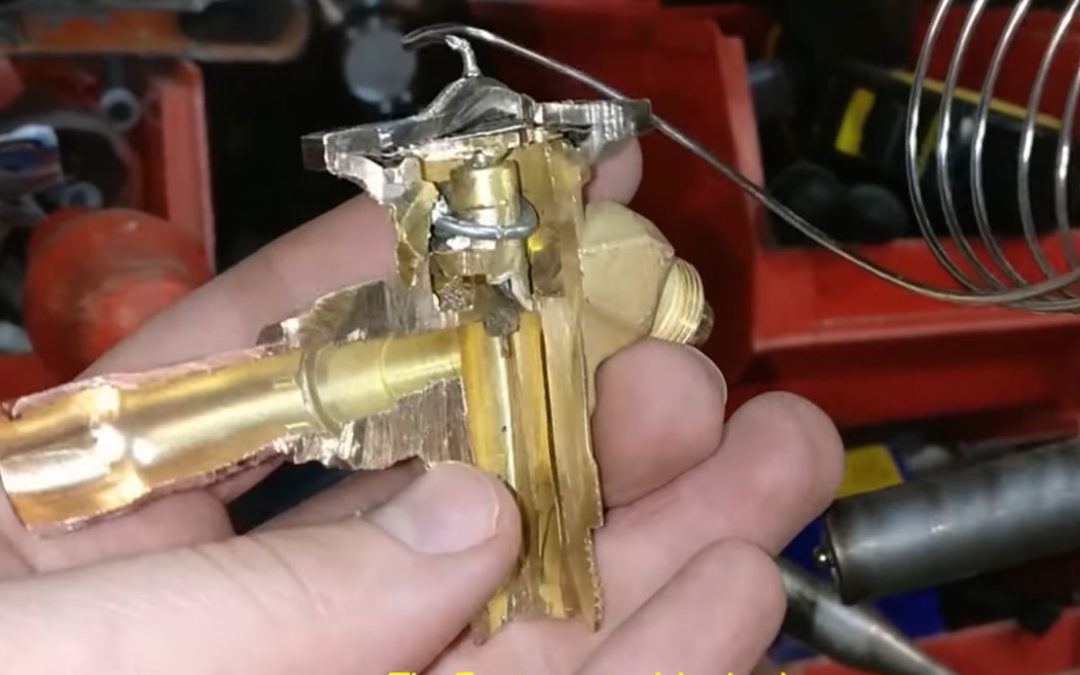AC is Constantly Running:
If your air conditioner keeps running after you turn it off, it could be because of a broken expansion valve. Assuming your temperature settings are adjusted correctly, the air conditioner should normally cycle on and off. There is likely a problem with temperature detection if your system is not turning off at the specified temperature and is operating continually.
This ongoing process usually indicates that there is an issue with the TXV, which may not be controlling the flow of refrigerant correctly. If the TXV isn’t working properly, the system will have to run for longer than needed due to poor cooling and operation. It is critical to contact an HVAC professional immediately upon seeing this symptom to get a diagnosis and fix the problem. Ignoring this issue may cause the system to wear down prematurely and result in higher energy bills.
Frozen Coils in Your Unit:
Another tell-tale sign of a malfunctioning expansion valve is frozen coils. Before the refrigerant reaches the evaporator coil, the TXV lowers its pressure and cools it. The coils could get frozen if the expansion valve isn’t working properly and the refrigerant gets too cold.
When coils freeze, they block airflow and your air conditioner works much less efficiently. The accumulation of frost or ice on the coils indicates that the TXV may be inoperable. Because of the possible health hazards connected with refrigerants, it is not a good idea to try to tackle refrigerant problems on your own. To safely address and fix the problem, it is necessary to contact a certified HVAC professional.
The Compressor Does Not Turn Off:
To keep the refrigerant flowing properly, the expansion valve and compressor work together in an air conditioning system. An overflow of refrigerant into the compressor could result from an improperly shut-off expansion valve. As a result, the compressor may have to run continuously.
Compressor failure to turn off can cause several problems, such as increased energy consumption, faster wear and tear, and higher maintenance or replacement costs. The compressor can overheat and fail early if it is operated continuously. Compared to fixing an expansion valve, which typically costs around $440, replacing a compressor can cost around $1,800. Immediate attention to any problems with the expansion valve is crucial to prevent expensive repairs and maintain efficient performance.
Odd Noises from AC Operation:
A broken expansion valve is one of several possible causes of strange noises coming from your air conditioner. The expansion valve can be malfunctioning if your air conditioner begins to make clanging, screeching, or slamming sounds.
When refrigerant flows irregularly, it can cause internal components to interact improperly, leading to these strange noises. The noises may become more severe as the problem continues, indicating that it needs to be addressed immediately. Have a professional take a look at your air conditioner if you notice strange noises emanating from it. If you take care of these problems quickly, you can stop additional damage and keep repair costs down.
Inconsistent Airflow Through Vents:
Another indicator that something is wrong with the expansion valve is if the airflow from your AC vents is inconsistent. Inconsistent airflow and uneven cooling can be caused by a malfunctioning TXV, which alters the flow of refrigerant.
You may notice that the air coming out of the vents changes from being too cold to being too warm. This discrepancy suggests that the TXV isn’t controlling the refrigerant flow correctly, which can impact your living space’s overall comfort. Get a professional to check out the expansion valve and fix it so you can enjoy steady airflow again.
Overall Poor Performance of the AC Unit:
If your air conditioner’s overall effectiveness suddenly drops, particularly during hot weather, it could be due to a faulty expansion valve. A variety of performance concerns might arise if the valve is clogged or damaged, which impacts the system’s capacity to cool effectively.
The inability to achieve the target temperature diminished cooling capability, and the unit’s tendency to blow warm air are all signs of subpar performance. Problems with the expansion valve could be the source of these troubles. The requirement for repair or replacement of the TXV can be determined by a comprehensive examination by an expert.
FAQs:
· How Does an Expansion Valve Work?
An expansion valve works by lowering the liquid refrigerant’s pressure, which causes it to evaporate and cool. The valve modifies the refrigerant flow rate in response to details from the evaporator coil regarding temperature and pressure. By doing this, the evaporator’s optimal temperature for heat absorption is maintained.
· Why Is Superheat Important And What Does It Mean?
The temperature of the refrigerant vapour over its boiling point at a particular pressure is referred to as superheated. It’s important because it makes sure the refrigerant is completely evaporated before going into the compressor, which keeps liquid refrigerant from causing damage to the compressor.
· What is the Role of the Sensing Bulb in a TXV?
A TXV’s detecting bulb is connected to the suction line next to the evaporator outlet and filled with refrigerant. It sends information to the valve, which modifies the flow rate following the temperature of the refrigerant vapour exiting the evaporator, after measuring it.
· What Distinguishes Electronic Expansion Valves (EEVs) from TXVs?
Electronic sensors and a control unit are used by electronic expansion valves (EEVs) to accurately control the flow of refrigerant. Thermostatic expansion valves (TXVs), which depend on mechanical feedback from the sensing bulb, are less accurate in control and less efficient than these.


